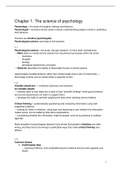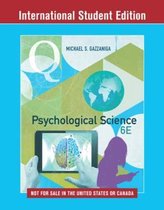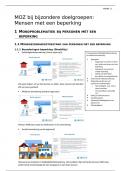Chapter 1: The science of psychology
Psychology = the study of thoughts, feelings and behavior.
Psychologist = someone whose career involves understanding people’s minds or predicting
their behavior.
Humans are intuitive psychologists
Psychological science uses data to find answers
1.1
Psychological science = the study, through research, of mind, brain and behavior.
→ Mind refers to mental activity (results from biochemical processes within the brain)
- memories
- thoughts
- feelings
- perceptual experiences (zintuigen)
→ Behavior describes the totality of observable human or animal actions
(psychologists studied behavior rather than mental states due to lack of instruments →
technology evolves and so mental state is explored further)
1.2
Amiable skepticism → combines openness and wariness
An amiable skeptic
→ remains open to new ideas but is wary of new “scientific findings” when good evidence
and sound reasoning do not seem to support them.
→ develops the habit of carefully weighing the facts when deciding what to believe
Critical thinking = systematically questioning and evaluating information using well-
supported evidence.
→ looking for holes in evidence, using logic and reasoning to see whether the information
makes sense, and considering alternative explanations.
→ considering whether the information might be biased, such as by personal or political
agendas
Many decades of psychological research have shown that people’s intuitions are often
wrong, and they tend to be wrong in predictable ways that make critical thinking very
difficult.
1.3
Common biases:
1. Confirmation bias
→ Ignoring evidence, only using/believing the evidence that you feel supports your
theory
1
, 2. Seeing causal relationships that do not exist
→ misperception that two events that happen at the same time must somehow be
related
3. Accepting after-the fact explanations
→ known as hindsight; Once people know an outcome, they interpret and
reinterpret old evidence to make sense of that outcome, giving a false sense of
predictability.
4. Taking mental shortcuts
→ can lead to inaccurate judgements and biased outcomes
mental shortcuts = heuristics
availability heuristic = when things that come most easily to mind guide our thinking
1.4
Positive illusions
→ better-than-average effect
→ optimism bias
- overestimate likelihood of experiencing positive events
- underestimate likelihood of experiencing negative events
People are often blissfully unaware of their weaknesses because they cannot judge those
weaknesses at all
hypothesis generation = take a moment to consider some possibilities;
Dunning-Kruger effect = people lack the ability to evaluate their own performance in areas
where they have little expertise
1.5
Mind/body problem = Are the mind and body separate and distinct, or is the mind simply
the subjective experience of ongoing brain activity?
dualism = the idea that the mind and the body are separate yet intertwined.
early views of dualism → mental functions had been considered the mind’s sovereign
domain, separate from body functions
Descartes’ view → the body was nothing more than an organic machine governed by
“reflex”. Many mental functions (memory and imagination) resulted from body
functions. Deliberate action was controlled by the rational mind. The rational mind
was divine and separate from the body.
Nowadays → psychologists reject dualism. The mind arises from brain activity and the
activities of the mind change the brain. The mind and brain do not exist separately.
Mind/body problem
→ separation of mental life and the body; “Is an emotion separate from the brain that
produces it?”
2
,Nature/nurture debate
→ origin of mental life; “Is an emotion caused by genetics or culture?”
= the arguments concerning whether psychological characteristics are biologically innate or
acquired through education, experience, and culture.
1.6
John Stuart Mill
→ become a science of observation and experiment (and psychology should leave the
realms of philosophy and speculation). He defined psychology as “the science of the
elementary laws of the mind” and argued that only through the methods of science would the
processes of the mind be understood.
William James
1890 → James published the first major overview of psychology:
He moved psychology beyond considering minds as sums of individual units and into
functionalism
His book Principles of psychology was the most influential book in the early history of
psychology.
Stream of consciousness = the mind is much more complex than its elements and
therefore cannot be broken down. The mind consists of an ever-changing, continuous series
of thoughts
According to James studying the mind is too complex to understand merely as a sum of
separate parts, like trying to understand a house by studying each of its bricks individually
functionalism = an approach to psychology concerned with the adaptive purpose, or
function, of mind and behavior.
natural selection = in evolutionary theory, the idea that those who inherit characteristics that
help them adapt to their particular environments have a selective advantage over those who
do not.
1.7
diversity and inclusion = the value and practice of ensuring that psychological science
represents the experiences of all humans
Most popular areas of specialization in psychology:
● Clinical
● Cognitive
● Cultural
● Developmental
● Health
● Industrial/Organizational
● Relationships
● Social-Personality
3
, Clinical
→ seeks to understand, characterize, and treat mental illness
(research, clinical work/therapy or a blend of the two)
Cognitive
→ aimst to understand the basic skills and processes that are the foundation of mental life
and behavior (memory, attention, sensation and perception)
Cultural
→ studies how cultural factors such as geographical regions, national beliefs and religious
values can have profound effects on mental life and behavior.
Developmental
→ studies how humans grow and develop from the prenatal period through infancy and early
childhood, through adolescence and early adulthood, and into old age. Focusing on how
experiences change across the lifespan and the periods in life when they are particularly
important.
Health
→ concerned with how psychological processes influence physical health and vice versa.
Stress, loneliness, and impulsivity can powerfully influence a range of health disorders and
even mortality. In contrast, optimism, social support and conscientiousness can promote
healthy behaviors.
Industrial/Organizational
→ explores how psychological processes play out in the workplace. Deals with interpersonal
conflicts at work and organizational change. (I/O blends social personality psychology
approaches with principles from management, communication and marketing.)
Relationships
→ research our intimate relationships, properties that make them succeed or fail, and the
two-way effects between intimate relationships and other aspects of our lives.
Social-Personality
→ study of everyday thoughts, feelings, and behaviors and the factors that give rise to them.
Focuses on the situational and dispositional causes of behavior and the interactions between
them.
1.8
EEG → measures changes in electrical activity
Magnetic Resonance Imaging (MRI) measures the structure of the brain
Functional MRI (fMRI) measures brain activity
- by measuring oxygen levels in the blood
Different areas of the brain are specialized for different functions, such as language, control
over behavior, and abstract thinking.
4






